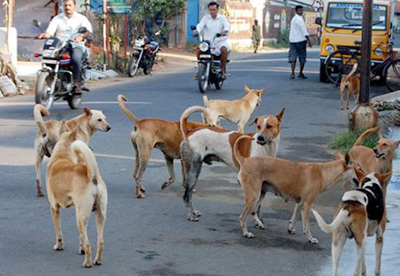Animal Birth Control Rules, 2022: Draft Rules allow Euthanasia for ill, wounded Street Dogs
Draft Animal Birth Control Rules pose challenge for local bodies
Onus on local authorities to implement slew of measures proposed by Centre
Even as instances of stray dog attacks and rabies deaths have triggered concern across the country, the protocols prescribed by the Centre under the draft Animal Birth Control Rules, 2022 for sterilisation and vaccination of dogs and feral cats pose a major challenge for local bodies.
The draft legislation authorises the local authorities to conduct the Animal Birth Control (ABC) programme through their own veterinary officers or through animal welfare organisations recognised by the Animal Welfare Board of India.
Increased instances of stray dog attacks and rabies deaths have been a major cause of worry for the civic and State authorities besides triggering public protests. Incidents of packs of stray dogs attacking passers-by, especially children, have been reported from various States.
The death of a 12-year-old girl at Kottayam in Kerala on Monday, even after taking three doses of anti-rabies vaccine, was the latest one in the State. There were also few other cases of dog bite victims dying despite taking the vaccines, raising doubts about the efficacy of the vaccine. The Kerala government has appointed an expert panel to look into the issue.
The rules
The rules cover pet dogs owned and kept indoor by individuals and street dogs or community-owned Indian dogs or abandoned pedigreed dogs which are homeless and living on streets or within gated campuses.
While the vaccination and sterilisation and deworming of the pet animals will be the responsibility of its owners, the local authorities will be accountable in the case of street dogs.
The draft rules propose animal helplines to deal with dog bites and rabid dogs. On receiving complaints, such dogs shall be humanely captured and kept for observation. If a dog is found to have a high probability of having rabies, it would be isolated till it dies a natural death.
The rules also moot the establishment of sufficient number of kennels and veterinary hospital facilities at the local level as well as the requisite number of vans with necessary modifications for safe handling and transportation of dogs and mobile operation theatres for sterilisation of animals.
Besides, local bodies will be required to set up incinerators for the disposal of organs and carcasses. CCTVs should be installed on the entire premises specifically in the operation theatre and the shelters where the animals are housed. The record of video surveillance shall be maintained for a minimum of three months, according to the draft rules.
Responsibility
Resident welfare associations, apartment owners associations or the representatives of the local bodies of each area have been made responsible for making necessary arrangements for feeding community animals.
Designated feeding spots, which shall be far from play areas of children, entry and exit points, staircase or in areas which are likely to be least frequented by children and senior citizens shall be arranged. The feeding time shall be fixed after considering the movement of children, senior citizens, and sports activities in each spot, it says.
‘Unrealistic’
Meanwhile, some ABC specialists highlight what they term as the unrealistic provisions regarding the qualification of veterinarians for ABC programmes.
The draft rules specify that the vets should have a combined experience of having conducted at least 5,000 ABC surgeries to be deployed in a municipal Corporation and at least 2,000 surgeries for grama panchayats or rural local bodies, which is an unrealistic proposition, points out K.J. Kishore Kumar, a veterinarian.
There may be hardly two or three such vets in each State. Ideally, those who have performed 200 to 500 such surgeries shall be considered for the job as they would have acquired the required expertise, says Dr. Kumar..
The draft rules are silent on the financial implications of the ABC project which could be a daunting task for most local bodies. Ensuring regular and timely flow of funds is important for the success of such programmes, says Dr. Kumar, who had initiated the ABC programme in Kochi.
The draft legislation states that the incurably ill and mortally wounded dogs, which are diagnosed by a team appointed by the Local Animal Birth Control Monitoring Committee, shall be euthanized in a humane manner by intravenous administration of sodium pentobarbital or any other approved humane manner, by a qualified veterinarian.
Source: The post is based on the article “Draft rules allow euthanasia for ill, wounded street dogs” published in TOI on 1st September 2022.
What is the News?
The Ministry of Animal Husbandry and Dairying has released the proposed Animal Birth Control Rules, 2022.
What are Animal Birth Control Rules, 2022?
Released by: Ministry of Animal Husbandry and Dairying
Aim: It proposes new rules for animal birth control programmes with the aim to prevent overcrowding of dogs and cats, especially street dogs.
What are the key provisions of the rules?
The rules 1) Provide detailed procedures for vaccination, immunization and sterilisation of pets and street/stray dogs/cats by owners and local civic authorities, 2) Allow the euthanasia of “incurably ill and mortally wounded” street dogs, 3) Propose setting up a monitoring committee that will decide to control the excess population of street dogs through animal birth control programmes in a specific area or region, 4) Suggests setting up an animal helpline by local authorities to resolve complaints regarding dog bites or rabid dogs, 5) Fixes responsibility of resident welfare associations(RWAs) in feeding community animals in their respective localities seeking to end day-to-day conflicts between such associations and dog feeders.
IMAGE COURTESY-helpanimalsindi



